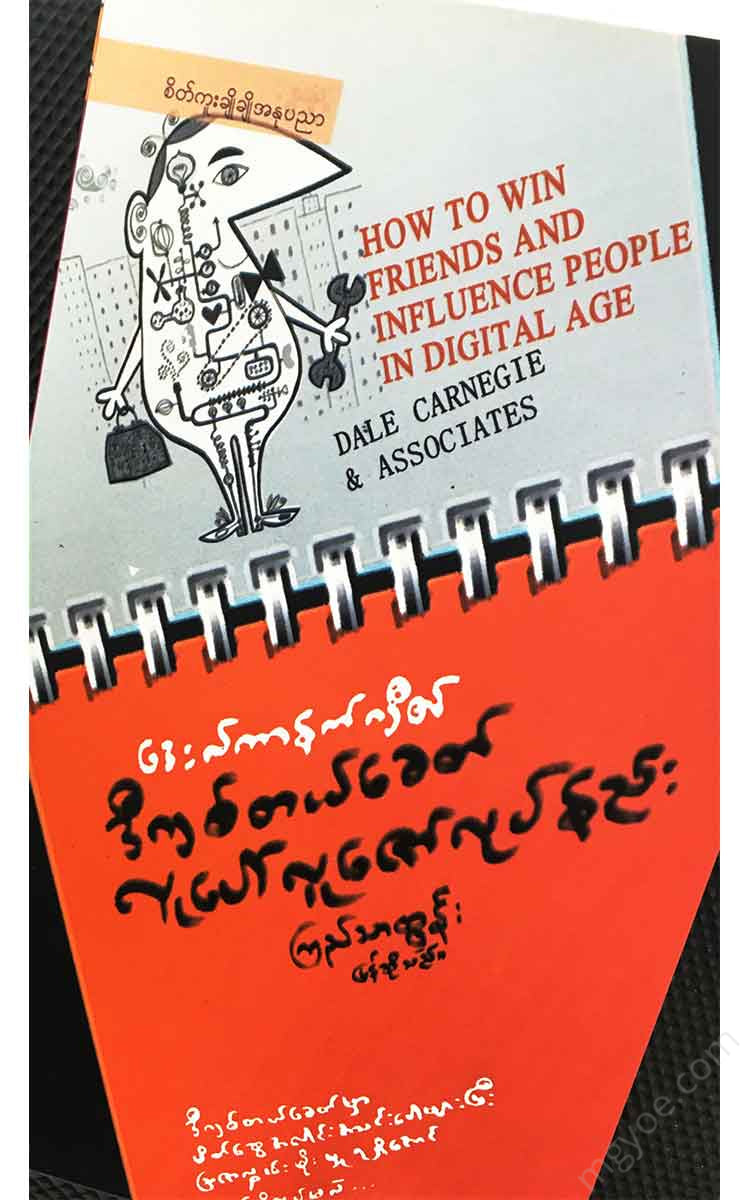စိတ်ကူးချိုချိုစာပေ
Kyi Tha Tun - Dale Carnegie's Way of Making Money in the Digital Age
Kyi Tha Tun - Dale Carnegie's Way of Making Money in the Digital Age
Couldn't load pickup availability
Chapter (1)
Don't let your body be wrapped around you.
Compare the phrase, “How fortunate it is for leaders that people do not think” with the phrase, “I am not interested in power for its own sake. Only power that is consistent with morality is right and good.” These are the words of Adolf Hitler and Martin Luther King Jr.
The difference is obvious. The first expression refers to the selfish nature of power, which is mixed with deceit and manipulation. The second expression refers to the nature of power, which is a combination of good and bad. We use it every day.
The words that are in between these two extremes. We have seen the end of each of these two extremes in history. When we communicate with each other, we communicate in two ways: by putting down the other person and by raising him up.
Here Carnegie advises not to criticize, criticize, or criticize. But living like that is becoming increasingly difficult these days. To say that we should be careful with our words is an understatement.
It's like saying, "Posting your thoughts on the vast digital canvas called the Internet is like saying what you want to say in front of an audience."
Digital communication systems provide the fastest and most cost-effective way to communicate with people. Today's technology is a powerful tool for attacking someone's reputation.
"It's faster and easier than ever before," says Guy Kawasaki, author of the best-selling book Enchantment.
The ease of communication is a good thing. That good thing has also brought back the modern-day notion of not criticizing, not criticizing, and not complaining. What was once a matter of private criticism has now become a punishable offense.
Consider the case of Dr. Patrick Michael Nasbit. He is a Canadian doctor. He wrote a defamatory post on Facebook about his daughter's mother (who was not his legal spouse). For this, he was fined $40,000.
Another case involved Liverpool's Dutch striker Ryan Babbel. After a defeat to Manchester United, he posted a picture of referee Howard Webb on Twitter, with the caption "They call this guy one of the best referees ever. What a joke." He was also fined £10,000. BBC blogger Benders commented on the incident: "A year ago Babbel would have been so angry he would have just told his girlfriend. Now he has a very handy tool at his fingertips to tell the world."
Even a casual comment between friends can be a serious matter in this day and age. In 2009, Proofpoint , a US company,
A survey of thousands of people found that 8 percent had been fired for commenting on social media sites like Facebook and LinkedIn. In 2011, the Huffington Post reported on 13 people who had been fired for posting on Facebook. The firings included the following issues:
A young female employee at a pizza shop is a customer.
He was served for three hours and was only paid a small amount of money. That was an hour more than he was supposed to be working. He called the two customers “cheap” on Facebook and was fired. A Philadelphia Eagles stadium employee was fired after criticizing the team for allowing his favorite player, Brian Dawkins, to sign with the Denver Broncos.
- Seven employees at a Canadian grocery store were fired after they created a Facebook group called I got Farm Boy'd and posted comments about customers on the group.
Criticism on social media spreads more easily than a kind message. And you will see that there is more judgment than forgiveness. Most people take the freedom to speak when someone else is wrong and the freedom to remain silent when they are wrong. If free speech is used as a sword and defamation as a shield, then human relations will become a battlefield. However, criticism and a culture of criticism are unfortunately a reality.
Powerful people don't speak up, no matter how right they are and how wrong the other person is. They understand that such talk can damage relationships in any way. Doing so can cause more damage than it builds. It can make a relationship more strained than it is comfortable with. That's why today we are so focused on the
It's no wonder we have more talkative leaders than good leaders. Most of them do nothing more than say what's right. They do everything they can.
Talking not only produces a poor result, it is also fuel. It will only fan the flames of the fire, creating a gap between “meaningful communication and meaningful collaboration.”
A true leader is able to handle even the most difficult situations with dignity. American President Lincoln is a role model. Look at how he dealt with a strategic mistake during the Civil War.
The Battle of Gettysburg was fought during the first three days of June 1863. On the night of July 4, General Robert E. Lee began his retreat south. At that time, storm clouds were scattering many of his men. Once General Lee's retreating army reached the Potomac, it was impossible to continue. Ahead was the raging river, which was impossible to cross. Behind was the victorious Union Army. General Lee had no way out. The Union Army had a great opportunity to capture General Lee and end the Civil War early.
President Lincoln, without calling a council of war, sent a telegram to General George Meade urging him to attack General Lee. He also immediately sent a special envoy urging him to fight without delay. However, General Meade called a council of war. He was hesitant to fight. Finally, the river subsided and General Lee and his troops were able to cross the river.
President Lincoln was furious. He immediately wrote a letter to General Meade. He said, "Dear General,
I do not think the General will be pleased with the misfortune of General Lee's escape. He was within our reach. His capture is connected with our subsequent success. The war may have been stopped. If the General could not attack him last Monday, how could he attack the South? He could only take two-thirds of his present force there. It is not to be hoped for, and I do not expect the General to be able to do so. The General's golden opportunity is lost. I am deeply grieved by this. But President Lincoln never sent the letter. It was not until after his death that I found it among his papers.
President Lincoln was a master of social communication. Everything he said was based on compassion. Sending that letter would have eased his anger somewhat. But at the same time, he seemed to think that it would have fanned the flames of General Meade's despair. More than that, he would have lost a good fighting general.
General Meade had only recently assumed command of the Army of the Potomac. He was certainly under great pressure. In the meantime, a rift between him and his subordinates would only make matters worse. If President Lincoln had sent the above letter, he would have won the war of words. He would have lost the war of influence.
This does not mean that General Meade cannot be held accountable for his mistakes. It simply means that there are two ways to be held accountable: one that is effective and one that is ineffective. President Lincoln made his disappointment known in a dignified manner. This act of doing so served as a motivation for General Meade to live and work as a good citizen in his hometown of Philadelphia until his death. President Lincoln was also able to maintain his influence over General Meade.
President Lincoln, more than any other American president in history, understood the concept of restraint. He was a man who understood human nature. We are self-protective creatures. When our well-being is threatened, we defend it, we reject it, we reject it. We do this even at the cost of our own dignity.
Can I or the reader be happy if I am rejected for something I do? We will never be happy if we are rejected, whether we deserve it or not. “Because we are so hungry for acceptance, we are so afraid of rejection,” says hormone expert Hansel Yee.
Using criticism to get your point across or to make a change is like taking two steps back. Leading people to make a change is like putting a horse to water. In any case, rejection is not part of your goal.
This applies not only when speaking in front of a large group of people, but also when speaking one-on-one.
When you write a comment on a blog or social media, it’s like you’re forcing the other person to respond. When the other person responds, you have little to say to break through the defenses they’ve built up. And everything you say next is viewed with suspicion. Worse, they’ll attack you. So criticism is like an invisible boomerang. It comes right back to the person who threw it. In this day and age, where you can communicate with the world at the touch of a button, a microphone, or a camera, these kinds of personal attacks are happening more and more quickly. Actor Mel Gibson unfortunately had to deal with this problem. His racist slur against his ex-girlfriend was recorded on her phone and broadcast to the world. It seriously damaged the reputation he had built up in Hollywood throughout his life.
The Reverend Jesse Jackson has also been caught on camera. Some of his remarks were caught on camera by Fox News. “Rev. Jesse Jackson appears to have personally attacked a Democratic candidate for his moral compass toward the black community,” CNN reported. Jesse









